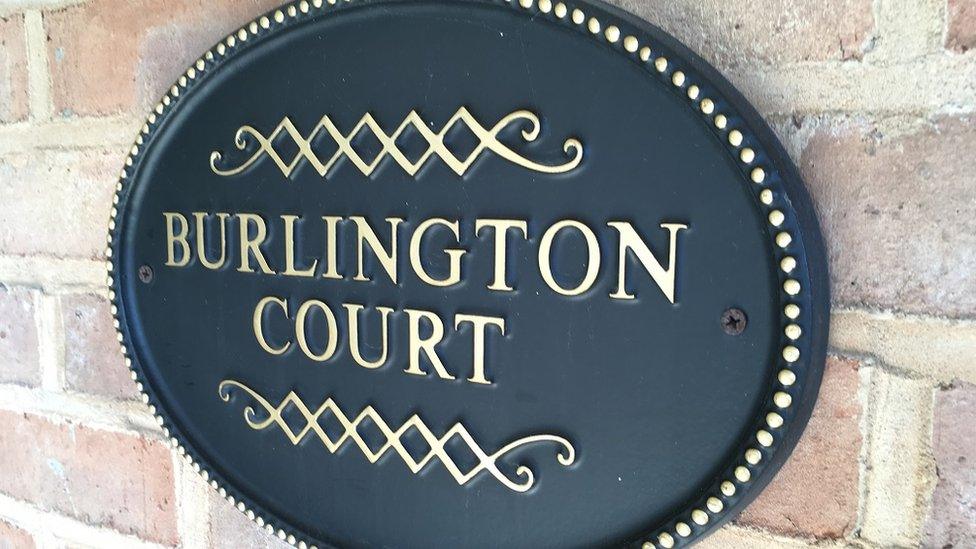Half of new-build retirement homes sell at a loss
- Published

Ken says his children have lost out from his retirement property dropping in value
Around half of new build retirement homes sold during a 10-year period were later re-sold at a loss, according to exclusive research for the BBC.
The research by the Elderly Accommodation Counsel charity found falls in value could be more than 50%.
It looked at thousands of Land Registry records for resale details of homes built between 1998 and 2012.
The charity found many properties built after 2002 had underperformed the general property market.
Adam Hillier of the Elderly Accommodation Counsel (EAC), which advises people considering retirement housing, called the scale of the falls "startling".
Steep falls
According to the research, 51% of retirement properties built and sold between 2000 and 2010, and then sold again between 2006 and 2016, suffered a loss in value.
For those properties which declined in value, the average loss was 17%.
For some, the falls are much steeper.
The EAC found that for new build retirement properties sold between 2005 and 2007, and then resold between 2012 and 2014, more than four fifths fell in value.
The average loss for these properties was 25%.

The Elderly Accommodation Counsel charity said the trend was "startling"
Mr Hillier said it was unclear why it was happening. "It's the million dollar question, really.
"I think part of it is the new build premium - especially when it comes to retirement housing," he said.
Another reason could be under-investment from developers once they have built the properties, he said.
"The traditional model was to hand over these properties to a managing agent to run them," he said. "Does the developer have that much of an interest in investing in the property?"
The trend has continued in recent years too. For new retirement properties sold between 2008 and 2010, and then resold between 2015 and 2017, nearly two thirds were sold for less than the purchase price.
The average loss here was 19%.
'It's criminal really'
Money Box spoke to the residents of one development - Burlington Court, in Bridlington in East Yorkshire - where prices have more than halved since it was first built around a decade ago.
According to Land Registry figures, one flat in Burlington Court, bought new in 2006 for £166,000, was resold for just £70,000 in 2014. Another two bedroom apartment bought for £140,000, in 2008, was sold last year for £58,000.
Ken, 91, bought his flat in Burlington Court for around £180,000 in 2008.
"I thought when I bought this that if I lived for another five or six years, my children would get maybe £190,000 for it," he said.
"In actual fact they'll be lucky to get £70,000 for it, maybe even £60,000.
"It's criminal really. When I mention it other people, they say: 'Why should you worry, you won't be here?'
"But I do feel my son and daughter have lost out. It's a lot of money," he added.

The developer said Burlington Court was hit by a lack of parking and difficult local market
Margarete, 92, paid nearly £150,000 for her flat eleven years ago. She sold a detached bungalow in York.
Like most residents of Burlington Court, she says it's a nice place to live, with a nice community of people.
But Margarete says she's always wanted to move back to Germany, where she was born.
However the value of her property means that isn't now an option.
"My friends in Germany always wanted me to go back."
"But if I get £40,000 for this flat I'd be lucky. I couldn't afford to go back to Germany and buy a place there."
Incentives
The largest developer of retirement homes, McCarthy and Stone, told the BBC that the numbers did not include incentives given to the original buyers, which effectively lowers the purchase price.
The company also said it had worked hard to increase resale values in recent years, including extending leases, retaining management of developments, and providing sales support.
"The vast majority of our retirement apartments increase in value on resale", McCarthy and Stone told the BBC in a statement.
"It is also important to understand that the value of specialist retirement housing is not purely financial. It improves lives, provides peace of mind, care and support and ultimately helps older people maintain their independence.
"However, we recognise that there are a small number of cases, particularly with our older properties, where resale values of some apartments haven't performed as we would have wished. This can be down to many reasons, including the performance of some local property markets."
McCarthy and Stone, which also built Burlington Court, said resale values in that particular development had been hit by a lack of car parking spaces and a difficult local property market.
'Seriously wrong'
Sebastian O'Kelly, director of BetterRetirementHousing.com, said:
"Dismal resale prices for retirement properties help explain why only 2% of over-65s live in designated retirement properties - far less than the US or Australia.
"Something is seriously wrong with the business model that these flats fall so drastically in value.
"The retirement housing sector will not expand notably until this is addressed. That would be more effective than attempting to deny that the problem exists."
Listen to the full report on Money Box, midday on Saturday 9 September on BBC Radio 4.